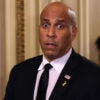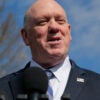Last week, a federal judge ordered the Biden administration to stop strong-arming Big Tech into silencing Americans’ free speech online in a first-of-its-kind temporary injunction. Rather than celebrating this move to uphold free speech, many legacy media outlets appear to be demonizing the very idea of protecting speech from government censorship, according to one of the lead attorneys in the case.
Liz Murrill, the solicitor general of Louisiana and co-counsel in the case Missouri v. Biden, spoke with The Daily Signal about the “misinformation or disinformation censorship complex” and criticized media outlets for suggesting that this censorship apparatus is a good thing.
“As someone who was a journalist at one time before I went to law school, it still baffles me to see the mainstream press buying into this massive effort to create a ‘misinformation’ or ‘disinformation’ censorship complex,” Murrill said. “It is so contrary to the First Amendment to see these media companies not only buying into it, but perpetuating this narrative that questions the value of freedom of speech.”
The Daily Signal depends on the support of readers like you. Donate now
In the case, the states of Missouri and Louisiana, along with many individuals censored on social media platforms, allege that the Biden administration “suppressed conservative-leaning free speech” on the Hunter Biden laptop story, on COVID-19 lockdowns and vaccines, on election integrity in the 2020 election, and even on President Joe Biden himself. The administration did this often in the name of combating “misinformation” or “disinformation” and protecting people from themselves.
Murrill cited Jen Easterly, the director of the federal Cybersecurity and Infrastructure Security Agency, who called it “really, really dangerous if people get to pick their own facts.”
The solicitor general told The Daily Signal that Easterly “basically said that we can’t allow people to decide their own facts, that it would be dangerous to let people decide their own facts. Well, that’s the whole foundation for the First Amendment.”
“Once you create a massive government edifice, an entire government process that permits censoring speech and co-opts these large companies and corporate authority through coercion by the federal government, you’ve tossed the First Amendment out,” Murrill contended.
She noted that the judge in the case, Terry Doughty in the U.S. District Court for the Western District of Louisiana, painstakingly presented all the evidence against the government in his ruling ordering the government not to strong-arm Big Tech into censoring Americans.
“The government was using threats of antitrust actions brought by the Department of Justice, or movements to try and take away their Section 230 immunity,” Murrill noted, referencing Section 230 of the Communications Decency Act, which protects social media platforms from liability for some content on their platforms. “So, these were [acts of] overt coercion.”
She explained how it worked: First, “a behind-the-scenes discussion” took place, then a White House official would issue threats to the tech companies right after they had a conversation with the companies about some information they wanted taken down.
“So, they actually created an entire pipeline to facilitate quicker action by the tech companies,” Murrill explained.
Americans might expect the legacy media to celebrate the judge’s order in the case, but the solicitor general noted that many of them appear to have taken the Biden administration’s side.
She recalled a conversation she had with Amna Nawaz on “PBS NewsHour,” in which the reporter repeatedly asked whether Murrill considered a “2020 election lie” to be protected under the First Amendment.
“You’re saying you do believe people should be able to spread misinformation about the 2020 election? Is that what you’re saying?” Nawaz asked.
Murrill recalled the interview this way:
One of the pointed questions was, ‘There are people who are election deniers, so they keep saying that the election was stolen, and that’s been demonstrably proven to be false. Should they be able to talk about that?’ The answer to that is yes. The First Amendment protects the ability to talk about that.
She also noted that The New York Times interviewed “disinformation researchers” who warned that the judge’s ruling followed from “an organized campaign pushing back on the idea of disinformation as a whole.” (Critics also argued that a New York Times article on the judge’s ruling said the claim that COVID-19 vaccines do not prevent the disease’s transmission is a “debunked claim,” when it is actually true.)
“The government and a lot of the people on the Left [are] questioning whether the First Amendment is appropriate,” Murrill said. “That if it does protect what they call ‘misinformation’ or ‘disinformation,’ then maybe it shouldn’t. And I keep going back to the question of, who are we allowing [to make such decisions]? We’re going to allow government to decide what’s information that we should acquire? That is just fundamentally contrary to the entire structure of our democracy.”
She lamented that in other countries, “the mainstream narrative, the government was able to drive what people could see and hear and think, and it led to disastrous, murderous consequences.”
She called the “demonization of the First Amendment” a “threat that leads to fascism.”
Listen to the interview below or read a lightly edited transcript.
Tyler O’Neil: This is Tyler O’Neil. I’m managing editor at The Daily Signal. I am joined by Liz Murrill, who is the solicitor general of Louisiana, and she’s also running for attorney general. She is co-counsel in a very important case, Missouri v. Biden, holding the Biden administration accountable for pressuring Big Tech to silence Americans. It’s a pleasure to have you with us.
Liz Murrill: Thanks. It’s great to be with you.
O’Neil: So, Liz, if you could just go over, just briefly, the case, the nature of it. I think it’s a very interesting story, obviously, and also, I think there are a lot of potential misunderstandings, so if you could clear that up.
Murrill: Yeah, I think they’re intentionally driven to create misunderstandings about our case. But it started out with a relatively small body of evidence that indicated that the government was colluding with Big Tech to censor people’s speech.
I think what we obtained, and were a little surprised at the beginning of the case, was preliminary discovery, which allowed us to produce and obtain, from the government and from the Big Tech companies, a lot more documents.
So just at the preliminary injunction stage, we ended up with 20,000 emails, documents showing that this was a much, much more expansive enterprise than I think we could have anticipated, that it goes through multiple government agencies—including [the Cybersecurity and Infrastructure Security Agency], the [Centers for Disease Control and Prevention], the FBI, even the Census Bureau was involved. But it started up at the White House.
O’Neil: Wow. And we’ve seen, as you’re pleading, say, almost exclusively conservative ideas being censored here, talking about the COVID-19 pandemic and opposing some of the restrictions there, talking about the 2020 election. Can you give us just a bird’s eye view of what was going on? And then I remember seeing Facebook admitting that it suppressed often true content about COVID vaccines.
Murrill: Well, and it wasn’t just Facebook that admitted it, the government admitted it. And what these documents show exceedingly clearly is that the government was taking down speech that it believed would contribute to vaccine hesitancy. It took down speech about the elections. It took down speech about Hunter Biden’s laptop. It took down memes about the first lady.
So there’s even some discussion in some of the emails from people at, say, Facebook saying they were concerned because it didn’t violate their community standards and the White House was directing them to take it down anyway.
And when it came to the vaccines specifically, there’s emails from Anthony Fauci, [former director of the National Institute of Allergy and Infectious Diseases], saying that they want him to take down anything that would contribute to vaccine hesitancy, which that would’ve included the true story about my son, who had myocarditis from the Pfizer vaccine and spent a week in ICU.
O’Neil: Ugh. So, I think one of the big things that surprised me, we got this historic ruling on July Fourth that you spoke with me about earlier this week, where the judge ordered the government to stop pressuring Big Tech.
This isn’t them telling them they can’t speak. This isn’t them telling them they can’t notify of potential terrorist threats or anything like that. But we saw this great ruling, very clear, very tailored. And then you had The New York Times come out with a story with misinformation experts complaining about it.
And where do you see this media bias coming from, and why doesn’t the left-leaning media seem to celebrate a victory for free speech?
Murrill: That’s an excellent question. And as someone who was a journalist at one time before I went to law school, it still baffles me to see the mainstream press buying into this massive effort to create a misinformation or disinformation, censorship complex.
It is so contrary to the First Amendment to see these media companies not only buying into it, but perpetuating it and perpetuating this narrative that questions the value of freedom of speech.
That’s what I’m seeing now, is they’re not defending what they did. Well, they’re not defending that they violated the First Amendment. They are saying they are essentially attacking the First Amendment because they admit what they’ve done. They just say that they think it’s the right thing to do.
And so they avoid the entire question of whether they’re legally able to do it because they are pivoting to a discussion about saying, “Well, it’s the right thing to do. We need to protect people from themselves and from this misinformation they might receive because they might not be able to discern whether it’s true or not true.”
Tyler, one of the most concerning statements that we saw was in an email from the director of CISA, who basically said that we can’t allow people to decide their own facts. That it would be dangerous to let people decide their own facts. Well, that’s the whole foundation for the First Amendment.
O’Neil: … Have you seen positive coverage of this from the mainstream press where they’re talking about—because I wouldn’t have believed that The New York Times would have a story right after a judge is saying, “This is Orwellian suppression of the truth,” that The New York Times would be on the side of the Orwellian suppression.
Murrill: It shocks me. It really does. I haven’t seen the mainstream press really start to address the fact that this is an assault on the First Amendment, which includes the freedom of the press. So I don’t know where they think this would end.
Once you create a massive government edifice, an entire government process that permits censoring speech and co-ops these large companies and corporate authority through coercion by the federal government, you’ve tossed the First Amendment out.
And I don’t know why they think that they would be able to control this weaponization of the government. It’s just as dangerous for them as it is to conservatives who are now being attacked.
O’Neil: And on that issue of conservatives being attacked, one of the major organizations I constantly follow and wrote a book about, the Southern Poverty Law Center, puts conservatives on a map with chapters of the KKK, with neo-Nazis, and is engaged in this information warfare that reminds me a lot of this misinformation attack.
Has the SPLC at all reached out to you to celebrate this free speech victory? Have they spoken out in favor of the other side? Have you heard anything from them on this?
Murrill: No, I haven’t heard anything from them.
I did an interview with “NewsHour.” They ran that interview. And I think they had me and then they had a professor from the University of Chicago Law School.
And I remember, just yesterday when I did this interview, that the questions, and I see this repeatedly, this happened to me a couple weeks ago when I testified in Congress, where I continue to get these questions. And the question is, “Well, we can talk about these things, but should we?” My answer to that is, “Yes, we should.”
One of the pointed questions was, “There are people who are election-deniers, so they keep saying that the election was stolen, and that’s been demonstrably proven to be false. Should they be able to talk about that?” The answer to that is “yes.” The First Amendment protects the ability to talk about that.
There are people who deny that the moon landing occurred. They think that it was created in a Hollywood studio. They actually get to talk about that. The government does not get to tell them that they aren’t able to discuss that, even if the rest of us or anybody thinks that it’s just something that isn’t accurate.
But people get to talk about inaccurate things and sometimes those things turn out to be accurate, which is proving to be true, I think, with a lot of discussions about the vaccine. There was a lot of discussion early on about adverse effects of the different vaccines and specific vaccines having specific effects, like the [Johnson & Johnson] vaccine. They’ve pulled it from the market.
O’Neil: Yeah.
Murrill: The myocarditis issue, actually proven to be a real problem. And so now they have cautions and they’re being a lot more cautious about it with young adult males. But the government hasn’t really changed its tune and now they’re basically saying that they weren’t actually mandating anybody to do anything and that it was always everybody’s choice. Talk about a slippery narrative.
O’Neil: Yeah. Well, I also want to hear if any of these organizations that are on the Left, these public interest groups that used to stand for the First Amendment and for many noble causes, like the ACLU, have they reached out to work with you on this at all?
Murrill: Yeah.
O’Neil: And then, has someone like the Foundation for Individual Rights and Expression, have they reached out to you? They’re not on the Left, but they’re a very free speech-oriented group.
Murrill: No. I think that everybody has underestimated the importance of this case. And so we are still in the preliminary stages. This was a preliminary injunction, so it’s possible that it was flying under the radar for a lot of these groups.
I think this opinion has created a pretty big splash. There’s been a lot of coverage of it. It will absolutely be moving through the 5th Circuit very quickly. The government has already filed for a stay with the district court judge, who I’m confident will deny it, and they’ll move on to the 5th Circuit.
They are predictably claiming that it is overbroad and they can’t discern, based on the way the injunction’s written, who they can talk to and who they can’t. But the injunction does not prohibit government from speaking. It simply prohibits them, fundamentally, from coercing the Big Tech companies into carrying out their censorship enterprise, which they shouldn’t have been doing anyway.
O’Neil: Yeah. Well, have you seen media outlets claiming that this is overbroad or is that just the Biden response?
Murrill: Well, I think the media outlets are promoting speakers who are saying that it’s overbroad. So I haven’t actually seen any opinion writer—but it’s pretty early on. I just haven’t seen a column yet that takes it and says—and that doesn’t mean they aren’t out there. I’ve seen a lot of coverage. I’ve seen a lot of people on Twitter and stuff saying that they think it’s overbroad.
But we had 85 pages of fact-finding by the judge that was very specific about what each agency was doing, who they were doing it with, and what they were doing in terms of coercing and pressuring the tech companies, all the way up through and including the White House.
O’Neil: Yeah. And are there a few of those really shocking pressure points that you would highlight? You quoted the woman from the administration saying that Americans shouldn’t be able to select their own facts. And the one that stood out to me was that Facebook admission on vaccine hesitancy. Were there any others that really stood out to you that you would emphasize?
Murrill: Well, the judge goes to some—he painstakingly illustrates how the government was using threats of antitrust actions brought by the Department of Justice, or movements to try and take away their Section 230 immunity. So these were overt coercion.
So what you would see is a behind-the-scenes discussion that was taking place, followed by a public press conference, where [then-White House press secretary] Jen Psaki, or somebody in the White House, usually it was Jen Psaki, were attaching those threats right after they had had a conversation with the tech companies about some information that they wanted taken down. And so they actually created an entire pipeline to facilitate quicker action by the tech companies.
And that put this whole thing on steroids because now you had multiple agencies that were sending and flagging information, and they were either downgrading it so it couldn’t be distributed heavily or they were flagging it and taking it down.
And then they were de-platforming people simply because they disagreed with their speech—like Tucker Carlson, for example—certain people who they had flagged as giving out disinformation or misinformation relative to the vaccines. But it tied back to vaccine hesitancy, not to whether it was true or not. And it was generally their opinion, which is also protected by the First Amendment.
So they acknowledged they were targeting speech that they knew to be protected. It’s really egregious.
O’Neil: Yeah. Just getting to this point in our society where one side thinks it’s acceptable to do this kind of thing to the other side. And what scares me partially about it is that this is, as you were saying, this is such an abuse of government power, that it almost broadens the horizon of conceivable abuse, that people on the other side could do it too. Conservatives shouldn’t be the only ones who are shocked and appalled by this.
Murrill: Well, and if you know anything, the First Amendment actually protects minority speech. It protects the minority opinion, not the majority opinion. So that’s what it’s always stood for, is being able to protect dissenting opinions. You don’t need to protect the majority opinion. You need to protect the dissenting opinion. That’s who will be targeted.
I think what really concerns me is seeing this movement toward demonizing the First Amendment itself. That’s what I see happening at 100,000 feet. And that’s what I see the government and a lot of the people on the Left doing, is questioning whether the First Amendment is appropriate. That if it does protect what they call misinformation or disinformation, then maybe it shouldn’t.
And I keep going back to the question of, who are we allowing? We’re going to allow government to decide what’s information that we should acquire? That is just fundamentally contrary to the entire structure of our democracy.
O’Neil: Yeah.
Murrill: It really is. It’s an existential threat to the republic as it’s created now.
O’Neil: And to the notion that the people have rights independent from the government.
Murrill: Right.
O’Neil: That those rights are actually prior to and decisive of what the government can do.
Murrill: Right. That they are fundamental and that they are inherent in us, and that we gave this power to the government. That they only have the power that we gave to it. That the federal government itself is limited power, only that power that we gave to it through the Constitution. And they are questioning the entire structure of that.
That’s what this attack on the First Amendment does. Who will decide what’s misinformation and disinformation? This whole enterprise that they had created answers that question. It says the government will decide and it will be the government that is in power that will decide what you get to hear and what you get to think.
You asked me about one of the things that I would flag and that really shocked me. It was the whole creation of a category at CISA called cognitive infrastructure. Cognitive infrastructure. That’s what we think.
So the government decided that it could create a category of critical infrastructure that it was empowered and obligated to protect called cognitive infrastructure, what people think. They’re giving themselves the power to decide the facts for us. And that means to limit what we can hear and think, see and think.
O’Neil: That term, the reason it shocks you so much, is that because—and I’m not saying it shouldn’t shock you, I’m just trying to break it down because I just hear “cognitive infrastructure” and I’m like, “OK. Well, Americans, maybe our national security—we all need minds to think.” But what does that mean in terms of the government deciding what cognitive infrastructure is and why is that terrifying?
Murrill: So, if we do actually put it back into the structure of the First Amendment, then if it’s content-oriented regulation, if it’s content-oriented censorship, which is what this is, then it would have to meet strict scrutiny. And so it has to be very narrowly tailored to achieve a compelling governmental purpose.
What they’ve done isn’t narrowly tailored at all. In fact, it’s as broad as they could get it because they openly acknowledged they were taking down protected speech.
And so you can see how quickly this devolves into a censorship enterprise by looking at exactly what they’ve done. It’s a case study in how quickly we can devolve into a government that now exercises autocratic power over us by dictating the speech that we’re able to obtain through these corporate platforms and these tech platforms.
Why that wouldn’t then extend to The New York Times, I don’t know. There is no limiting principle on this idea.
O’Neil: And by cognitive infrastructure, that means that the way that all Americans think is pertinent to the government’s integrity, essentially is—
Murrill: Yeah.
O’Neil: Yeah.
Murrill: And so, if we take the example from the interview that I did where she asked me about the election being stolen, there’s this idea, this narrative out there that it is false, that it’s not correct to say that the election was stolen.
People have different reasons for thinking that the election was stolen. They may say that because there were lawsuits over a lot of state laws that inhibited those laws from taking effect during COVID. They may say that because they believe that there was cheating, in their state or in another state.
They may say that for a variety of reasons, but they actually do have a legal protected right under the First Amendment to have that conversation and to talk about it and to think that.
Whether you agree with them or not is your decision. Whether you want to engage in that discussion is your decision. But the government doesn’t get to decide whether you get to have that conversation or hear that conversation from somebody else. And that’s so scary about this structure.
And when you see the mainstream press saying, “So you think—” It’s the way they ask the question. “You think people ought to be able to talk about the election being stolen?” Yeah, actually, I do. I think more speech is the solution to the problem. Sunlight and more speech is the solution. If you think that’s a problem, then talking about it is the solution, not having the government censor what we can talk about.
O’Neil: And, to be clear, you think that people should be able to say if they think [Donald] Trump was an illegitimate president, as I heard so many times on the Left. It’s funny, when they were questioning the election of 2016, the Right didn’t go after them and try to ban them from social media and all this kind of stuff. But now the shoe’s on the other foot.
Murrill: It just points out that this is really about content moderation and an attempt to place the power in the hands of government to determine content moderation. And it’s just a very, very bad path that we’re on. It does put the First Amendment directly in the crosshairs because it is demonizing the First Amendment itself, not just the speech that they’re targeting.
O’Neil: Yeah. And to see the media support it in any facet is just—
Murrill: That’s just unbelievable. And history tells us, I mean, we’ve seen this happen in history. I don’t know why we wouldn’t look at what’s happened in other fascist countries, where the mainstream narrative, the government was able to drive what people could see and hear and think, and it led to disastrous murderous consequences.
So it’s just a terrible path to be on. And I think it’s one that our Founders rejected. It drove a revolution that drove the Declaration of Independence that drove the revolution that drove the Constitution. And now here we are seeing a judge who is attempting to shine daylight and illustrate, through 80 pages of fact-finding, what the government was doing and he’s being attacked.
O’Neil: So, just to be clear, you said like we saw in other fascist countries. Do you think that this is a fascist, a threat to our Constitution?
Murrill: Absolutely, I do. I do. I think it is a threat that leads to fascism.
And we saw that happen in Nazi Germany, where the government was able to take control of corporations and over the press. We’ve seen it in Cuba, we’ve seen it in Soviet Russia. I mean, you can see it right now in China. It’s not like you have to look to the past to see what happens when the government can control the entire press and all avenues of public discourse.
O’Neil: Yeah. Well, thank you so much for joining me, Liz. Is there anything else that you’d like to add?
Murrill: No, I just think it’s good that we’re talking about it. I think we ought to keep talking about it. And I think we ought to encourage anybody who believes in the First Amendment to join this fight and to not view this as a partisan issue.
It’s not a partisan issue. It shouldn’t be viewed as a partisan issue. It is a threat to anybody, to every citizen of this country because it threatens the First Amendment. And I would like to continue to discuss it and try to see if people will understand and join us.
And we’ve got to continue to educate people about why the First Amendment matters. Otherwise, we’re going to create a generation that doesn’t care about it, doesn’t value it, and is going to throw it out. It’s going to be relegated to the trash bin of history. And I don’t know where we go from there.
O’Neil: Yeah. That’s a very sobering thought, that such a thing could happen.
Murrill: Yeah. One generation. One generation to lose the republic.
O’Neil: Well, thank you again so much, Liz. And where can people follow you?
Murrill: Well, I work with the attorney general now. I’m running for attorney general and my website is www.Liz4LA.com. So Liz4LA.com.
O’Neil: Great. Thanks so much again for joining us.
Murrill: Thanks, Tyler. Thanks for having me.
Have an opinion about this article? To sound off, please email letters@DailySignal.com and we’ll consider publishing your edited remarks in our regular “We Hear You” feature. Remember to include the url or headline of the article plus your name and town and/or state.





























